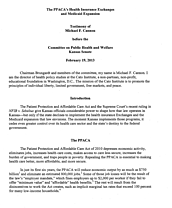Chairman Brungardt and members of the committee, my name is Michael F. Cannon. I am the director of health policy studies at the Cato Institute, a non-partisan, non-profit, educational foundation in Washington, D.C. The nmission of the Cato Institute is to promote the principles of individual liberty, limited government, free markets, and peace.
Introduction
The Patient Protection and Affordable Care Act and the Supreme Court’s recent ruling in NFIB v. Sebelius give Kansas officials considerable power to shape how that law operates in Kansas-but only if the state declines to implement the health insurance Exchanges and the Medicaid expansion that law envisions. The moment Kansas implements those programs, it cedes even greater control over its health care sector and the state’s destiny to the federal government.
The PPACA
The Patient Protection and Affordable Care Act of 2010 depresses economic activity, eliminates jobs, increases health care costs, makes access to care less secure, increases the burden of government, and traps people in poverty. Repealing the PP ACA is essential to making health care better, more affordable, and more secure.
In just its first six years, the PPACA will reduce economic output by as much as $750 billion and eliminate an estimated 800,000 jobs. Some of those job losses will be the result of the law’s “employer mandate,” which fines employers up to $2,000 per worker if they fail to offer “minimum value” and “affordable” health benefits. The rest will result from the disincentives to work the Act creates, such as implicit marginal tax rates that exceed 100 percent for many low-income households.
The “individual mandate” requires nearly all Americans to purchase a government-designed health plan or pay a penalty. That mandate has already increased the cost of health insurance for millions of Americans, has forced many to choose between violating their religious principles and paying a fine, and will increase premiums for millions more Americans when it takes full effect in 2014. Neutral observers and even supporters of the law project that in 2014, some consumers and employers will see their health insurance premiums rise by more than 100 percent.

This work is licensed under a Creative Commons Attribution-NonCommercial-ShareAlike 4.0 International License.

